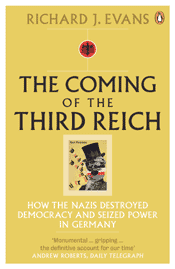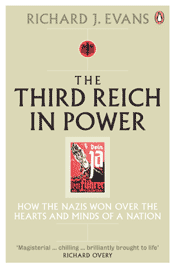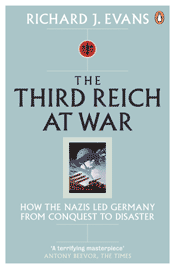The Nazis and their Children
by Michael Wagstaff
Remembering The Armed Struggle: Life In Baader-Meinhof – Margrit Schiller
The Coming Of The Third Reich – Richard J. Evans
The Third Reich In Power – Richard J. Evans
The Third Reich At War – Richard J. Evans
Richard J. Evans’ trilogy on the Nazis’ Third Reich is predictable, writes MICHAEL WAGSTAFF, unlike Margrit Schiller’s Baader-Meinhof memories which asks the awkward questions that have no easy answers. Even today, decades after that Doris Day era, the history of post-war German history is still too sensitive for proper historical study.
|
 The most flawed, though thought-provoking, chapter in the trilogy by Richard J. Evans is the final one of the final volume, after the Nazis have been defeated and reconstruction has begun.
Evans does not attempt to claim that Germany turned over a new leaf or had a change of heart: he notes in passing, instead, that middle-class professional associations, for instance, used their power to protect their members from prying eyes and difficult questions. That is, they protected the Nazis, and Nazi sympathisers in their midst. These people simply slipped quietly into the Christian Democrat Union (CDU) if they bothered to become politically active again. There was, in other words, no 'closure’. He doesn't delve into the advent of the Cold War and the changing political priorities of the West and the United States in particular. Konrad Adenauer, leader of the CDU and first post-war chancellor in 1949, summed it all up: a stern throwback Catholic (born in 1876) who had been active in the Centre Party that capitulated to Adolf Hitler during the enabling debate in March 1933.
Out of all this, of course, emerged the Red Army Faction, the RAF, the 'Baader-Meinhof gang’ as it is known. Young men and women born just before, during, or just after, the war. They experienced all this at first hand during the 1950s and 1960s – and then exploded. Even today, decades after that Doris Day era, the history of post-war German history is still too sensitive for proper historical study. (Our knowledge of Andreas Baader, for instance, is still in large part based on Alan Rickman's wonderful self-mocking Hans Gruber in Diehard, made in 1988, 11 years after his suicide in prison at the age of 34.) Instead we find it more comfortable to write about the Nazis, because the script is unequivocal.
The most flawed, though thought-provoking, chapter in the trilogy by Richard J. Evans is the final one of the final volume, after the Nazis have been defeated and reconstruction has begun.
Evans does not attempt to claim that Germany turned over a new leaf or had a change of heart: he notes in passing, instead, that middle-class professional associations, for instance, used their power to protect their members from prying eyes and difficult questions. That is, they protected the Nazis, and Nazi sympathisers in their midst. These people simply slipped quietly into the Christian Democrat Union (CDU) if they bothered to become politically active again. There was, in other words, no 'closure’. He doesn't delve into the advent of the Cold War and the changing political priorities of the West and the United States in particular. Konrad Adenauer, leader of the CDU and first post-war chancellor in 1949, summed it all up: a stern throwback Catholic (born in 1876) who had been active in the Centre Party that capitulated to Adolf Hitler during the enabling debate in March 1933.
Out of all this, of course, emerged the Red Army Faction, the RAF, the 'Baader-Meinhof gang’ as it is known. Young men and women born just before, during, or just after, the war. They experienced all this at first hand during the 1950s and 1960s – and then exploded. Even today, decades after that Doris Day era, the history of post-war German history is still too sensitive for proper historical study. (Our knowledge of Andreas Baader, for instance, is still in large part based on Alan Rickman's wonderful self-mocking Hans Gruber in Diehard, made in 1988, 11 years after his suicide in prison at the age of 34.) Instead we find it more comfortable to write about the Nazis, because the script is unequivocal.
 But after 1945? Instead of the Richard J. Evans history of the Nazi era we have to make do with fragments, flashes of lightning that illuminate a hidden landscape. The memoir by Margrit Schiller, a minor member of RAF who spent six years and three months in jail, is one such. Written with little help by a brave, honest woman it makes no apologies for those misguided rebels but simply points out the savagery that was being carried out in South America, Vietnam and other parts of the Third World at the time and is being carried out in the name of the West today - in Iraq and Afghanistan.
Simply recounting some of the facts about her life give a clue to it all: born in 1948 and brought up on a grim estate on the outskirts of Oberursel near Frankfurt, both her lower-middle-class parents were Nazi sympathisers; she recounts how her father, who fought at Stalingrad, blurted out his role in torturing a Russian soldier to death during a drunken ramble with Margrit's younger sister Doris when she was 13. Twelve years after the war he was able to slip back into uniform as part of 'counterintelligence’ in the German army. Schiller's mother, a college lecturer, became an activist in the CDU, her son Dieter deteriorated into being a psychological wreck before seeking salvation in a guru-style sect.
Schiller inevitably disowned this inheritance and reinvented herself as a valued member of an alternative non-familial community of comrades. This took her to the left, the RAF, prison, exile in Cuba and then Uruguay where she met the Tupamaros. Later, after the collapse of the Uruguayan economy, she returned reluctantly to Germany with her two children, still, essentially, in exile. Her testimony lacks all the comfortable eloquence, sweep and sure-footedness of Evans's history; it is, instead, often obsessive and overly introverted, but it has one quality that Evans's narrative lacks, an almost viscous sense of contemporaneity, sucking at the reader like a relentless swell. It also puts awkward questions that have no pat answers.
But after 1945? Instead of the Richard J. Evans history of the Nazi era we have to make do with fragments, flashes of lightning that illuminate a hidden landscape. The memoir by Margrit Schiller, a minor member of RAF who spent six years and three months in jail, is one such. Written with little help by a brave, honest woman it makes no apologies for those misguided rebels but simply points out the savagery that was being carried out in South America, Vietnam and other parts of the Third World at the time and is being carried out in the name of the West today - in Iraq and Afghanistan.
Simply recounting some of the facts about her life give a clue to it all: born in 1948 and brought up on a grim estate on the outskirts of Oberursel near Frankfurt, both her lower-middle-class parents were Nazi sympathisers; she recounts how her father, who fought at Stalingrad, blurted out his role in torturing a Russian soldier to death during a drunken ramble with Margrit's younger sister Doris when she was 13. Twelve years after the war he was able to slip back into uniform as part of 'counterintelligence’ in the German army. Schiller's mother, a college lecturer, became an activist in the CDU, her son Dieter deteriorated into being a psychological wreck before seeking salvation in a guru-style sect.
Schiller inevitably disowned this inheritance and reinvented herself as a valued member of an alternative non-familial community of comrades. This took her to the left, the RAF, prison, exile in Cuba and then Uruguay where she met the Tupamaros. Later, after the collapse of the Uruguayan economy, she returned reluctantly to Germany with her two children, still, essentially, in exile. Her testimony lacks all the comfortable eloquence, sweep and sure-footedness of Evans's history; it is, instead, often obsessive and overly introverted, but it has one quality that Evans's narrative lacks, an almost viscous sense of contemporaneity, sucking at the reader like a relentless swell. It also puts awkward questions that have no pat answers.
 Normally speaking, readers skip the foreword but this one is the exception. It is written by Osvaldo Beyer, a communistic-leaning anarchist Argentinian who went to university in Germany in the early 1950s. He hints at the political ambience, listing a number of desk-bound ex-Nazis who held prominent positions in the new Germany and he places the RAF in the context of Guevarism and Che's disillusion with social democracy after the 1954 coup in Guatemala.
Evans, instead, is a predictable but good read. His coverage of the war is striking: essentially, the Nazis were stuffed from minute one. Firstly, they received more knocks than they bargained for when they took on the Poles; second, they just got lucky when they defeated the French as their high-risk gamble of going through the Ardennes came off: third, Great Britain demonstrated the limits of their power during the Battle of Britain (forget all the nonsense about the few and the many) and finally, the Soviet Union showed as early as late 1941 that they couldn't hack it. By the autumn of 1942 leading figures in Germany knew the writing was on the wall and, after Stalingrad, it was downhill all the way. In a book that makes too little use of statistics the ones he cites about relative size of GDP and arms production show clearly why the game was up. The second aspect of his coverage of the war is the emphasis he gives to racism (and racial eugenics) as the central part of Nazism and the savagery (towards Jews, Slavs, gypsies, the mentally ill) to which it gave rise. The first part of the final volume is, in this sense, difficult to read because of the sustained cruelty of the Nazis and the German army.
The first volume, in contrast, struggles to come up with anything so cogent or convincing about the rise of the Nazis though he gets into his stride once Hitler gets into power describing, for instance, how the Nazis tried to protect their socioeconomic base in the lower middle class, especially in the countryside. Even here, however, it would have been useful to have had a more authoritative examination of how Hjalmar Schacht produced an economic template that simultaneously solved the unemployment problem (via an arms economy) without triggering unmanageable inflation. One senses that Evans, despite all his footnotes, shies away from the numbers game to keep the general reader on side, which is a pity given the importance of the subject.
Normally speaking, readers skip the foreword but this one is the exception. It is written by Osvaldo Beyer, a communistic-leaning anarchist Argentinian who went to university in Germany in the early 1950s. He hints at the political ambience, listing a number of desk-bound ex-Nazis who held prominent positions in the new Germany and he places the RAF in the context of Guevarism and Che's disillusion with social democracy after the 1954 coup in Guatemala.
Evans, instead, is a predictable but good read. His coverage of the war is striking: essentially, the Nazis were stuffed from minute one. Firstly, they received more knocks than they bargained for when they took on the Poles; second, they just got lucky when they defeated the French as their high-risk gamble of going through the Ardennes came off: third, Great Britain demonstrated the limits of their power during the Battle of Britain (forget all the nonsense about the few and the many) and finally, the Soviet Union showed as early as late 1941 that they couldn't hack it. By the autumn of 1942 leading figures in Germany knew the writing was on the wall and, after Stalingrad, it was downhill all the way. In a book that makes too little use of statistics the ones he cites about relative size of GDP and arms production show clearly why the game was up. The second aspect of his coverage of the war is the emphasis he gives to racism (and racial eugenics) as the central part of Nazism and the savagery (towards Jews, Slavs, gypsies, the mentally ill) to which it gave rise. The first part of the final volume is, in this sense, difficult to read because of the sustained cruelty of the Nazis and the German army.
The first volume, in contrast, struggles to come up with anything so cogent or convincing about the rise of the Nazis though he gets into his stride once Hitler gets into power describing, for instance, how the Nazis tried to protect their socioeconomic base in the lower middle class, especially in the countryside. Even here, however, it would have been useful to have had a more authoritative examination of how Hjalmar Schacht produced an economic template that simultaneously solved the unemployment problem (via an arms economy) without triggering unmanageable inflation. One senses that Evans, despite all his footnotes, shies away from the numbers game to keep the general reader on side, which is a pity given the importance of the subject.
 His description of the battle with the Catholic church and the infighting inside the Protestant church is also valuable, as is his slightly tart attitude to Martin Niemöller, as a Nazi sympathiser who modified his views. The greatest weakness of the coverage in both these earlier volumes is, however, his account of the Left, particularly the Communist party, in Germany and the Soviet Union. Here it is really essential to supplement it with the sort of insights you get from, for instance, Stephen F. Cohen or Robert C. Tucker who are much more rounded and nuanced. The account of the opposition to the Nazis after 1933 is also disappointing. People are mentioned but then we never hear of them again. Presumed dead?
Evans never asks awkward, penetrating questions (Niemöller is surprising because it is exceptional), most of the time he is tacitly reinforcing '2-0, 2-0’ Brit attitudes, which probably partly explains why this sort of volume is so popular. Having said that Evans makes clear that the Nazis knew, even at the height of their popularity, that it was touch and go (their maximum vote in a free election, in July 1932, was 37.4%) and that they had to act quickly before the tide ebbed, as it was already doing before Hindenburg handed over the chancellorship to Hitler. Even after the final 'terror election’ in 1933, when the Communist party was banned but still 'elected’ 81 deputies, the combined Social Democrat-Communist group had 201 deputies. The social democrats could still have blocked the enabling act in March 1933 if they had received support from non-Nazi parties, notably the Catholic Centre Party, with 93 votes. The movement is also often hard to pigeonhole: Hitler, he makes clear, was not a bourgeois, as his edgy attitude to the generals demonstrated. His bonds with 1923 loyalists were much deeper. The Nazis were also 'modernist’ in an almost rude ideological way that was lost after the war when a conservative retreat into tradition, Christian faith and family papered over the cracks. Goebbels, an ultra-modernist, would have been appalled.
His description of the battle with the Catholic church and the infighting inside the Protestant church is also valuable, as is his slightly tart attitude to Martin Niemöller, as a Nazi sympathiser who modified his views. The greatest weakness of the coverage in both these earlier volumes is, however, his account of the Left, particularly the Communist party, in Germany and the Soviet Union. Here it is really essential to supplement it with the sort of insights you get from, for instance, Stephen F. Cohen or Robert C. Tucker who are much more rounded and nuanced. The account of the opposition to the Nazis after 1933 is also disappointing. People are mentioned but then we never hear of them again. Presumed dead?
Evans never asks awkward, penetrating questions (Niemöller is surprising because it is exceptional), most of the time he is tacitly reinforcing '2-0, 2-0’ Brit attitudes, which probably partly explains why this sort of volume is so popular. Having said that Evans makes clear that the Nazis knew, even at the height of their popularity, that it was touch and go (their maximum vote in a free election, in July 1932, was 37.4%) and that they had to act quickly before the tide ebbed, as it was already doing before Hindenburg handed over the chancellorship to Hitler. Even after the final 'terror election’ in 1933, when the Communist party was banned but still 'elected’ 81 deputies, the combined Social Democrat-Communist group had 201 deputies. The social democrats could still have blocked the enabling act in March 1933 if they had received support from non-Nazi parties, notably the Catholic Centre Party, with 93 votes. The movement is also often hard to pigeonhole: Hitler, he makes clear, was not a bourgeois, as his edgy attitude to the generals demonstrated. His bonds with 1923 loyalists were much deeper. The Nazis were also 'modernist’ in an almost rude ideological way that was lost after the war when a conservative retreat into tradition, Christian faith and family papered over the cracks. Goebbels, an ultra-modernist, would have been appalled.
-
– Michael Wagstaff
|